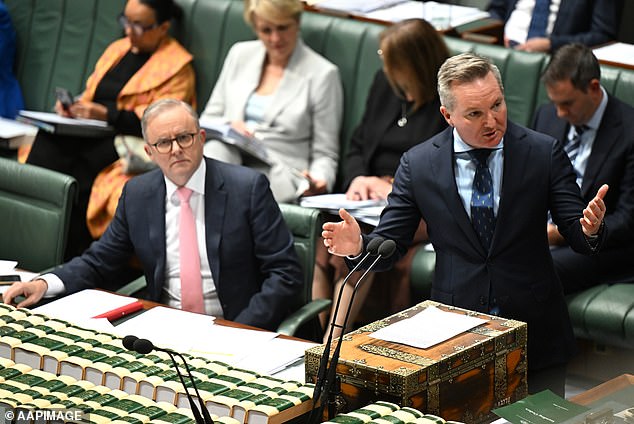Ben Fordham warns of ‘bad news coming’ for every Aussie household – as he loses it at Anthony Albanese
Prime Minister Anthony Albanese has been criticised for failing to deliver on promised reductions in energy bills, with fears that bills will only rise further as the cost of living crisis grips the country.
Wholesale electricity costs rose 23 percent in the second quarter compared to the same period last year, according to data from the Australian Energy Market Operator.
This increase was caused by lower renewable energy production and the outage of outdated coal-fired power stations as the government moves away from the cheaper energy source for environmental reasons.
The wholesale price increase will not be felt immediately by consumers, but will significantly increase prices for annual accounts at the next standard market offering on July 1, 2025.
Ben Fordham from 2GB criticised Chris Bowen, the Minister for Climate change and Energy, and Mr Albanese on the price increases.
“Under Chris Bowen’s leadership, energy bills have not dropped by $275 as Anthony Albanese promised,” Fordham said.
‘If wholesale prices go up 23 percent, you can expect your energy bill to go up the same amount. Can you afford that?
“The average annual energy bill is about $1,300, so if we are right and energy bills rise by another 23 per cent, the average energy bill in Australia will skyrocket to $1,600.”
The Albanian government has introduced a $300 discount on energy bills starting July 1. However, critics argue that such discounts only reduce pressure on energy companies to lower prices and also fuel inflation.
Ben Fordham has criticised Anthony Albanese over his pledge to cut energy bills as Australian households face new threats of higher energy costs
Fordham criticised Bowen for “lecturing everyone” on the benefits of renewable energy, while the resulting higher bills have left many struggling, as food prices and mortgage and rent costs soar.
“Your energy bill could go up another $300, and Mr. Bowen still thinks he’s in a position to lecture everyone about energy policy,” Fordham said.
‘If you’re already struggling to pay your energy bill, avoid the inbox or letterbox because unfortunately, bad news is on the way.’
Fordham also criticized Bowen for “demonizing” coal-fired power, which he said grew production 7 percent in the second quarter and provided six times more energy than wind farms.
“Our coal plants were operating at about 80 percent of capacity,” Fordham said.
‘So evil coal, as they like to call it, has been filling in the gaps and working overtime to keep Australia running. The same energy source demonised by Energy Minister Chris Bowen.’
While the policy focused on renewables and against coal was intended to combat global warming, the latest wholesale price increase was ironically caused by record demand for electricity during a very cold June quarter.
‘On the East Coast we have seen low temperatures and prolonged cold spells, particularly in Victoria, which has increased demand during the morning peak through to late autumn and the first month of winter,’ explains Daniel Westerman, CEO of AEMO.
‘Long periods of low wind have led to lower wind energy production, which has fallen by 20 percent compared to last winter, to a quarterly average of 2,657 megawatts. Wind energy availability has fallen to its lowest level since the second quarter of 2017.
“These market conditions highlight the important role that batteries, hydro and flexible gas generation will play as renewables become increasingly dominant in Australia’s electricity grids,” Mr Westerman said.
AER board member Jarrod Ball said a combination of challenges had caused wholesale prices to rise.
“We expect wholesale prices to rise as the weather cools in the southern states and demand to keep people warm increases, but the combined impact of cold spells, planned and unplanned grid outages, combined with new bidding and lower solar and wind production, has pushed electricity prices higher than this time last year,” Mr Ball said.

Fordham criticised Albanese (left) for failing to deliver on his promise to cut energy bills by $275 and also took aim at Australia’s Climate Change and Energy Minister Chris Bowen (right) for ‘demonising’ coal-fired power stations
Weak renewables led to a comeback in coal-fired electricity generation, with coal-fired electricity generation up 7 percent and gas-fired electricity generation up 16 percent.
The Australian Pipelines and Gas Association warned that the winter’s “renewable drought” highlights the need for a reliable backup.
The trade association called for gas-fired electricity generation to be included in the Capacity Investment Scheme, a national framework for subsidising wind, solar and battery projects, to ensure system security.
According to the regulator, generator and grid failures also created opportunities for some market participants to maximize their profits and shift their energy supply to higher price levels.
But Mr Bowen claimed that renewables were keeping energy prices low.
‘The data shows that renewables provide cheaper energy, and when we are forced to rely on coal plants and ageing unreliable assets, it drives up prices. The sooner we can get more reliable renewables into the system, the better it will be for energy bills and energy reliability.’
